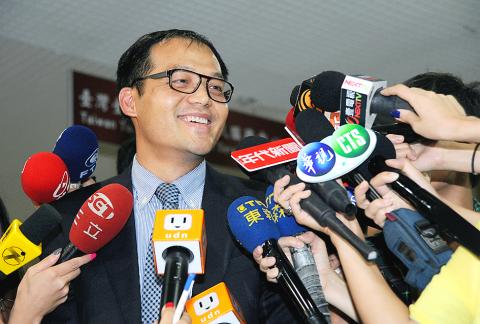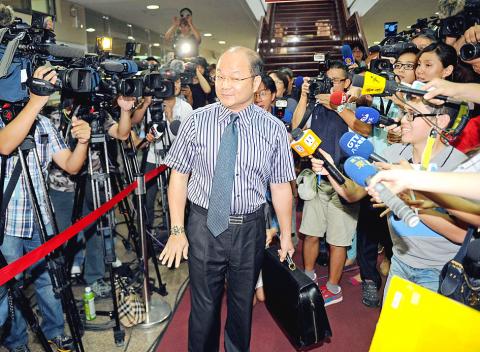Facing accusations of influence peddling, Legislative Speaker Wang Jin-pyng (王金平) yesterday took his battle with the Chinese Nationalist Party (KMT) and President Ma Ying-jeou (馬英九) to the Taipei District Court in the hope of retaining his KMT membership and legislative speaker position.
The court held its first session yesterday afternoon to review Wang’s challenge of a KMT decision, which revoked the 72-year-old politician’s membership in the party for his role in alleged illegal lobbying.
The court did not hand down a ruling yesterday. According to the Code of Civil Procedure (民事訴訟法), the court should make a ruling within seven days of a provisional injunction.

Photo: Liu Hsin-de, Taipei Times
Wang and Ma did not attend the court session.
Former Democratic Progressive Party legislator and attorney Chiu Tai-san (邱太三), who represented Wang, filed an injunction against the revocation with the Taipei District Court as well as a civil lawsuit seeking to overrule the KMT’s decision.
The Wang camp filed an additional temporary restraining order on Wednesday night, which argued that Wang should retain his position as speaker.

Photo: CNA
Hsu Ying-chieh (許英傑), another lawyer for Wang, said his client claimed that the KMT’s decision had violated the principle of proportionality since the party did not revoke the party membership of former Executive Yuan secretary-general Lin Yi-shih (林益世) and KMT Taipei City councilor Lai Su-ju (賴素如), both of whom have been indicted for corruption.
Neither did the KMT grant Wang the 20-day appeal period stipulated in the party’s charter, Hsu said.
The KMT’s Anti-Corruption Committee could still reverse the punishment on appeal — but only if the punishment is found to be non-compliant with party rules. Even if that happens, Wang will still be out of the party until the committee makes a ruling, sources in the KMT said.
In 2010, the KMT revised its rules so that disciplinary measures would remain in effect even during appeals, they said.
The KMT will not interfere with Wang’s move to request a court review of the Central Evaluation and Discipline Committee’s decision, the sources said, adding that it is his right to pursue the course of action.
Wang said he hoped that he could retain the speaker position to resolve a series of important issues that are related to social and political stability, including a controversial cross-strait service trade agreement, a referendum proposal on the Fourth Nuclear Power Plant and the central government’s budget plan, the lawyer said.
Wang has been a major player in the KMT and since becoming speaker of the legislature in 1999, has enjoyed popularity among both ruling and opposition lawmakers. He started his legislative career when he was elected in 1975. He was a legislator-at-large in 2004.
Chen Ming (陳明), a lawyer who represented the KMT, said the KMT urged the court to uphold its decision to expel Wang for interfering with the judiciary.
“Which deserves to be protected more? Wang’s political career or the KMT’s pledge and determination to uphold the law?” Chen asked reporters.
Earlier yesterday, the legislature’s secretariat confirmed that it had received a notice regarding the revocation of Wang’s KMT membership from the Central Election Commission (CEC) in an electronic file on Wednesday night.
Gao Chiu-lai (高秋來), director of the legislature’s Conference Department, said that the notice would be processed in line with normal procedures.
According to the Civil Servants Election and Recall Act (公職人員選舉罷免法), the legislature is required to void Wang’s status as a lawmaker and send the result back to the CEC so that it can announce the name of a KMT legislator-at-large nominee to take over Wang’s seat. Under the law, the legislature is not subject to a prescribed period to complete the process.
CEC Vice Chairman Liu I-chou (劉義周) reiterated yesterday that Wang lost his status as a legislator the same day his party membership was revoked.
Liu said he was surprised that many people were still unsure about Wang’s legislative status despite the developments.
Wang said he had no comment on Liu’s views that his legislative seat had been invalidated immediately after the KMT ruled on the case on Wednesday.
Additional reporting by CNA

SECURITY: As China is ‘reshaping’ Hong Kong’s population, Taiwan must raise the eligibility threshold for applications from Hong Kongers, Chiu Chui-cheng said When Hong Kong and Macau citizens apply for residency in Taiwan, it would be under a new category that includes a “national security observation period,” Mainland Affairs Council (MAC) Minister Chiu Chui-cheng (邱垂正) said yesterday. President William Lai (賴清德) on March 13 announced 17 strategies to counter China’s aggression toward Taiwan, including incorporating national security considerations into the review process for residency applications from Hong Kong and Macau citizens. The situation in Hong Kong is constantly changing, Chiu said to media yesterday on the sidelines of the Taipei Technology Run hosted by the Taipei Neihu Technology Park Development Association. With

CARROT AND STICK: While unrelenting in its military threats, China attracted nearly 40,000 Taiwanese to over 400 business events last year Nearly 40,000 Taiwanese last year joined industry events in China, such as conferences and trade fairs, supported by the Chinese government, a study showed yesterday, as Beijing ramps up a charm offensive toward Taipei alongside military pressure. China has long taken a carrot-and-stick approach to Taiwan, threatening it with the prospect of military action while reaching out to those it believes are amenable to Beijing’s point of view. Taiwanese security officials are wary of what they see as Beijing’s influence campaigns to sway public opinion after Taipei and Beijing gradually resumed travel links halted by the COVID-19 pandemic, but the scale of

A US Marine Corps regiment equipped with Naval Strike Missiles (NSM) is set to participate in the upcoming Balikatan 25 exercise in the Luzon Strait, marking the system’s first-ever deployment in the Philippines. US and Philippine officials have separately confirmed that the Navy Marine Expeditionary Ship Interdiction System (NMESIS) — the mobile launch platform for the Naval Strike Missile — would take part in the joint exercise. The missiles are being deployed to “a strategic first island chain chokepoint” in the waters between Taiwan proper and the Philippines, US-based Naval News reported. “The Luzon Strait and Bashi Channel represent a critical access

Pope Francis is be laid to rest on Saturday after lying in state for three days in St Peter’s Basilica, where the faithful are expected to flock to pay their respects to history’s first Latin American pontiff. The cardinals met yesterday in the Vatican’s synod hall to chart the next steps before a conclave begins to choose Francis’ successor, as condolences poured in from around the world. According to current norms, the conclave must begin between May 5 and 10. The cardinals set the funeral for Saturday at 10am in St Peter’s Square, to be celebrated by the dean of the College